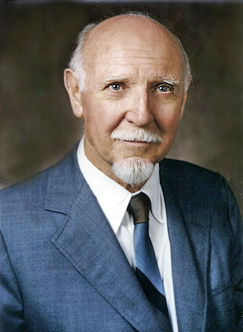“Dominance… is shown in assertive, independent, confident and stubborn behaviour.”
Source: The Scientific Analysis of Personality, 1965, p. 369
Raymond Bernard Cattell was a British and American psychologist, known for his psychometric research into intrapersonal psychological structure. His work also explored the basic dimensions of personality and temperament, the range of cognitive abilities, the dynamic dimensions of motivation and emotion, the clinical dimensions of abnormal personality, patterns of group syntality and social behavior, applications of personality research to psychotherapy and learning theory, predictors of creativity and achievement, and many multivariate research methods including the refinement of factor analytic methods for exploring and measuring these domains. Cattell authored, co-authored, or edited almost 60 scholarly books, more than 500 research articles, and over 30 standardized psychometric tests, questionnaires, and rating scales. According to a widely cited ranking, Cattell was the 16th most eminent, 7th most cited in the scientific journal literature, and among the most productive, but controversial psychologists of the 20th century.Cattell was an early proponent of using factor analytic methods instead of what he called "subjective verbal theorizing" to explore empirically the basic dimensions of personality, motivation, and cognitive abilities. One of the results of Cattell's application of factor analysis was his discovery of 16 separate primary trait factors within the normal personality sphere . He called these factors "source traits". This theory of personality factors and the self-report instrument used to measure them are known respectively as the 16 personality factor model and the 16PF Questionnaire .Cattell also undertook a series of empirical studies into the basic dimensions of other psychological domains: intelligence, motivation, career assessment and vocational interests. Cattell theorized the existence of fluid and crystallized intelligence to explain human cognitive ability, investigated changes in Gf and Gc over the lifespan, and constructed the Culture Fair Intelligence Test to minimize the bias of written language and cultural background in intelligence testing. Wikipedia

“Dominance… is shown in assertive, independent, confident and stubborn behaviour.”
Source: The Scientific Analysis of Personality, 1965, p. 369
Source: The Scientific Analysis of Personality, 1965, p. 14 (quote doesn't seem to be present in 1966 edition)
“Overt anxiety… that part of anxiety of which the individual is aware and ready to speak.”
Source: The Scientific Analysis of Personality, 1965, p. 372
Source: The Scientific Analysis of Personality, 1965, p. 16 (1966 edition)
Source: The Scientific Analysis of Personality, 1965, p. 18
“[ Personality is]… that which tells what a man will do when placed in a given situation.”
Source: The Scientific Analysis of Personality, 1965, p. 25
Raymond Cattell (1987), Intelligence: Its Structure, Growth and Action. p. 61
Cattell (1972). A New Morality from Science: Beyondism, p. 38.
Source: The Scientific Analysis of Personality, 1965, p. 192
Source: The Scientific Analysis of Personality, 1965, p. 160